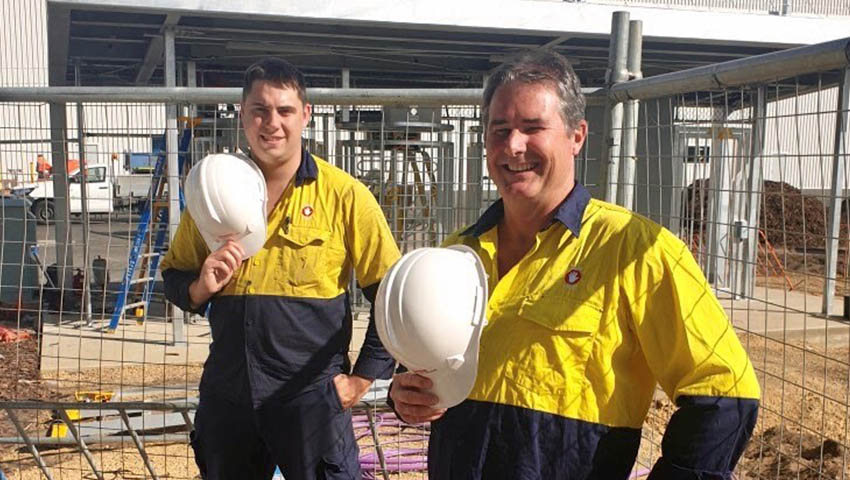BAE Systems Australia in partnership with ASC Shipbuilding and Flinders University have launched Australia’s first digital shipbuilding course to prepare for the government’s $95 billion Naval Shipbuilding Plan.
To continue reading the rest of this article, please log in.
Create free account to get unlimited news articles and more!
Fifty-three shipbuilding workers, whose roles on the Hobart Class Air Warfare Destroyer Program end on Friday, 27 March, will take part in the digital upskilling program, which is funded by the Commonwealth and South Australian governments.
The newly created Diploma of Digital Technology will educate shipbuilders-come-students on digital technologies required as part of the $35 billion Hunter Class frigate program, and will help retain important shipbuilding capability between shipbuilding programs.
Defence Minister Linda Reynolds said, “The Morrison government’s $90 billion Naval Shipbuilding Plan is creating thousands of jobs in South Australia with the workforce expected to grow from 2,500 workers today to more than 6,300 by 2030.”
During the course, students will combine theoretical approaches to Industry 4.0 technology with hands-on experience to prepare them for work at the state-of-the-art Osborne Naval Shipyard in South Australia, one of the world's most technologically advanced shipyards.
“This is why Defence, in partnership with ASC Shipbuilding, Flinders University, TAFE SA and the Naval Shipbuilding College, are progressing a training program for a Diploma in Digital Technologies which will retain the skills and expertise needed for the Hunter Class Frigate program,” Minister Reynolds added.
“As we build the world’s most advanced digital shipyards in South Australia, this government is focused on fostering an innovative and world‑class Australian workforce that will continue for generations to come.”
Federal Education Minister Dan Tehan added, “These courses are a timely reminder that as Australia deals with the challenge of COVID-19 there are still job opportunities and a demand for graduates with job-ready skills.
“These courses strengthen the link between our universities and the businesses that employ graduates. The skills that participants will develop will support continuous naval shipbuilding in Australia, and will be a boon to the graduates in terms of their future employability.”
Despite coronavirus presenting extreme challenges across Australia and the world, Flinders University is using innovative means to ensure the course can be delivered online, which means students can conduct their learning at home.
ASC Shipbuilding managing director Craig Lockhart added, “The face of modern shipbuilding is changing and the Diploma of Digital Technology will enable current shipbuilders to keep pace with the latest trends while ensuring they are equipped for the future.
“Our partnership with Flinders University means we will upskill shipbuilders on the latest in Industry 4.0 technologies and techniques, benefiting not only the Hunter Class frigate program but the broader shipbuilding industry. Flinders has responded very well to the COVID-19 situation and converted most of the tuition to online, which is embracing the new technologies that we will require in a modern data-rich shipyard.”
When day-to-day life resumes some normality, students will be able to attend classes at Flinders University located at the Tonsley Innovation District in Adelaide’s south.
Flinders University vice-chancellor Professor Colin Stirling added, “We are delighted to once again be partnering with ASC Shipbuilding to apply our research and teaching expertise across digital systems and industrial transformation to further equip these and many other highly skilled workers to meet the current and emerging needs of the defence industry.”
Course orientation commences on 30 March, and the course itself will run from April 2020 until January 2021.
The goal of the Naval Shipbuilding Plan is to ensure that the regeneration of the Royal Australian Navy over the coming decades will ensure both a cost-effective solution for the government and provide Navy the assured capability to fight and win.
The National Naval Shipbuilding Office has been established to implement the Naval Shipbuilding Plan.
The Australian government is laying the foundations for an Australia-wide, continuous National Naval Shipbuilding Enterprise, ending the boom-bust cycle that has afflicted the Australian naval shipbuilding and sustainment industry.
This will provide certainty to local businesses and shipbuilding workers and provide direct and indirect employment opportunities for generations to come.
The government will invest:
- around $90 billion in new naval ships and submarines;
- more than $1 billion in modern shipyard infrastructure; and
- up to $62 million in workforce growth and skilling initiatives to enable the delivery of these platforms.
Four key enablers are required to implement the government’s Naval Shipbuilding Plan:
- modern, innovative and secure naval shipbuilding infrastructure;
- workforce growth and development;
- a sustainable and cost-competitive Australian industrial base; and
- a national collaborative approach.
The Naval Shipbuilding Plan, released on 16 May 2017, outlines the government’s vision for the Australian naval shipbuilding enterprise and the significant investment required in coming decades.
Stephen Kuper
Steve has an extensive career across government, defence industry and advocacy, having previously worked for cabinet ministers at both Federal and State levels.

 Login
Login








